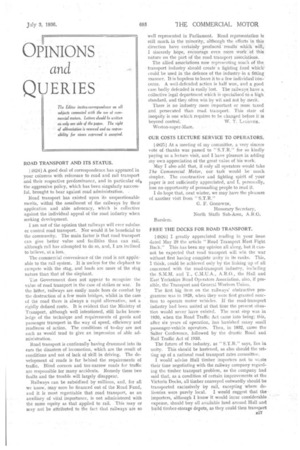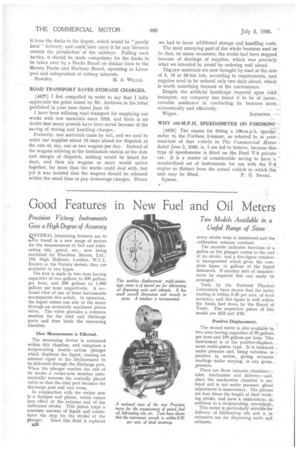OPINIONS
Page 37

Page 38

If you've noticed an error in this article please click here to report it so we can fix it.
and
QUERIES
ROAD TRANSPORT AND ITS STATUS.
[4824] A good deal of correspondence has appeared in your columns with reference to road and rail transport and their respective predominance, and in particular ofa the aggressive policy, which has been singularly successful, brought to bear against road administration, .
Road transport has existed upon its unquestionable merits, withal the assailment of the railways by their application and able advocacy, which is collective against the individual appeal of the road industry when seeking development.
I am not of the opinion that railways will ever subdue or control road transport. Nor would it be beneficial to the community. The main factor is that road transport can give better value and facilities than can rail, although rail has attempted to do so, and, I am inclined to believe, at a loss, The commercial convenience of the road is not applicable to the rail system. It is useless for the elephant to compete with the stag, and loads are more of the stag nature than that of the elephant.
The Government does not appear to recognize the value of road transport in the case of strikes or war. In the latter, railways are easily made hors de combat by the destruction of a few main bridges, whilst in the case of the road there is always a' rapid alternative, not a rigidly defined route. It is evident that the Ministry of Transport, although well intentioned, still lacks knowledge of the technique and requirements of goods and passenger transport in the way of speed, efficiency and readiness of action. The conditions of to-day are not such as would tend to give an impression of able administration.
Road transport is continually having drummed into its ears the disasters of locomotion, which are the result of conditions and not of lack of skill in driving. The development of roads is far behind the requirements of traffic. Blind corners and too-narrow roads for traffic are responsible for many accidents. Remedy these two faults and the trouble will largely disappear.
Railways can be subsidized by millions, and, for all we know, may soon be financed out of the Road Fund, and it is most regrettable that road transport, as an auxiliary of vital importance, is not administered with the same equity as that applied to rail. This may or may not be attributed to the fact that railways are so
well represented in Parliament. Road representation is still much. in the 'minority, although the efforts inthis direction have certainly produced • results winch will I sincerely hope, encourage .even more work of this nature on the part of the road transport aSsociations. The allied associations now representing much of the transport industry should create .a fighting fund which= could be used in the defence of the industry-in a fitting manner. It is hopeless to leave it to a few individual 'cOn-• cents, A well-defended action is half won, and a, good case badly defended is easily lost. The railways haVe a. collective legal department which iS specialized, to a high standard, and they often win by wit and not by merit.
There is no industry more important or more taxed and persecuted than road. transport. This state of inequity is one which requires to be changed before it is beyond control. W. T. LALONDE. Weston-super-Mare.
OUR COSTS LECTURE SERVICE TO OPERATORS.
[4825] At a meeting of my committee, a very sincere vote of thanks was passed to " S.T.R." for so kindly paying us a lecture visit, and I have pleasure in adding my own appreciation of the great value of his work.
May I also add that, if only all operators would take The Commercial Motor, our task would be much simpler. The constructive and fighting spirit of your paper is not sufficiently appreciated, and I, personally, lose no opportunity of persuading people to read it,
I do hope that, next winter, we may have the pleasure of another visit from " G. F. GOODWIN, Honorary Secretary, North Staffs Sub-Area, A.R.O. Burslem.
FREE THE DOCKS FOR ROAD TRANSPORT.
[4820] I greatly appreciated reading in your issue dated May 29 the article "Road Transport Must Fight Back." This has been my opinion all along, hut it cannot be expected that road transport will win the war without first having complete unity in its ranks. This, I think, could be achieved only by the linking up of all concerned with the road-transport industry, including the S.M.M. and T., C.M.U.A., A.R.O., the Hull and East Yorkshire Road Operators Association, also, if possible, the Transport and General Workers Union.
The first big item on the railways' obstructive programme was in 1928, when they were first granted sanction to operate motor vehicles. If the road-transport industry had been united at that time the present situation would never have existtd. The next step was in 1930, when the Road Traffic Act came into being; this, after six years of operation, has banished many small passenger-vehicle operators. Then, in 1932, came the Salter Conference, followed by the drastic Road and Rail Traffic Act of 1933.
The future of the industry, as " S.T.R." says, lies in unity. This should be hastened, as also should the setting up of a national road transport rates committee.
I would advise Hull timber importers not to waste their time negotiating with the railway company regarding the timber transport problem, as the company had said that, as a condition of certain improvements at the Victoria Docks, all timber conveyed outwardly should be transported exclusively by rail, excepting where de
liveries were purely local. I would .suggest that the importers, although I know it would incur considerable expense, should-buy all available land around Hull and build timber-storage depots, as they could then transport
it from the docks to the depots, which would be "purely local" delivery, and could later carry it for any 'distance outside the jurisdiction of the railways. Failing such tactics, it should be made compulsory for the docks to be taken over by a Docks Board on similar lines to the Mersey Docks and Harbour Board, operating in Liverpool and independent of railway interests.
Rowsley. M. A. WILLIS.
ROAD TRANSPORT SAVES STORAGE CHARGES.
{482'7] I feel compelled to write to say that I fully appreciate the point raised by Mr. Andrews in his letter published in your issue dated June 19.
I have been utilizing road transport for supplying our works with raw materials since 1928, and there is no doubt that many pounds have been saved because of the saving of storing .and handling charges.
Formerly, raw materials cameby rail, and we used to order our supplies about) .10 .days ahead for dispatch at the rate. of, say, one or two wagons Per day. Instead of the wagons arriving at the destination station at the date and Margin of dispatch, nothing would be heard for days, and then ..six wagons or more would arrive together, far more than the works could deal with, but yet it was insisted that the wagons should be released within the usual time or pay demurrago charges. Hence
we had to incur additional storage and handling costs.
The most annoying part of the whole business used to be that, on many.occasions, the works had been stopped because of shortage of supplies, which was precisely what we intended to avoid by ordering well ahead.
Thkraw materials are now brought by road at the rate of 5, 10 or 20-ton lots, according to requirements, and supplies need to be ordered only two days ahead, which is worth something because of the convenience.
Despite the artificial handicaps imposed uppn. transport, my company has found it to be of inconm ceivable assistance in conducting its business more , economically and efficiently.
Wigan. SATISFTETY. ;
WHY 100-M.P.H. SPEEDOMETER ON FORDSON?
[4828] The reason for fitting a 100-m.p.h. spee49meter to the Fordson 3-tonner, as referred to in your road-test of that vehicle in The Commercial Motor dated June 5, 1936, is, I am led to believe, because this type of speedometer is fitted on the Ford V-8 private car. It is a matter of considerable saving to have 'i standardized set of instruments for use with the V-8 engine as distinct from the actual vehicle to which the unit may be fitted. P. G. SMART. Epsom.




















































































